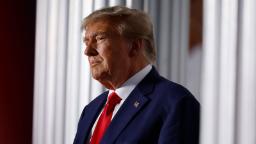[ad_1]

CNN
—
The first hearing for Donald Trump and the special counsel’s office before Judge Aileen Cannon in the Mar-a-Lago documents case will be in Fort Pierce, Florida, on July 14.
The hearing is set to discuss pretrial issues around classification, with Cannon on Monday granting a request from special counsel Jack Smith that she hold the hearing under the Classified Information Procedures Act.
Trump and his co-defendant Walt Nauta are not required to be present at the hearing, according to the new court order, though it is the first time their defense teams are set to appear before Cannon.
Additionally, Cannon ordered on Monday that the defendants respond by July 6 to the special counsel’s request that the trial be delayed until December.
According to the Friday filing from Smith’s team requesting the delay, the defendants’ attorneys “confirmed they do not oppose an adjournment of the current trial date and request a status hearing with the Court to address the schedule in this action,” as the defense lawyers “anticipate filing an opposition to this motion addressing their objections to the government’s proposed dates.”
Cannon previously scheduled the trial to begin in mid-August, but it was widely expected the start date would be pushed back.
Trump is facing charges of willful retention of national defense information, obstruction, and false statements in the federal investigation into the handling of classified documents from his White House. He has pleaded not guilty. Nauta, who faces obstruction-related charges, is scheduled for an arraignment on Tuesday, where he will have the opportunity to enter his plea.
The scheduling orders from Cannon came shortly after she denied a request from Smith’s team to file under seal a list of witnesses with whom Trump cannot speak about the classified documents case.
While Cannon did not raise any problems with the restriction, her new order seemed to question why filing the list on the docket was necessary in the first place. The judge also said that prosecutors had not provided adequate reasoning for why the list, if filed in court, should be kept completely under seal.
“The Government’s Motion does not explain why filing the list with the Court is necessary; it does not offer a particularized basis to justify sealing the list from public view; it does not explain why partial sealing, redaction, or means other than sealing are unavailable or unsatisfactory; and it does not specify the duration of any proposed seal,” Cannon said in her order.
Media organizations, including CNN, have argued in court filings that the list should be publicly disclosed.
With her new order, Cannon is denying the government’s bid to file the list without prejudice – meaning that the prosecutors can make the request again. She also said the media organizations’ request to intervene to argue for more transparency was denied as moot.
Magistrate Judge Jonathan Goodman, who presided over Trump’s arraignment earlier this month, raised the issue of prohibiting Trump from discussing the case with certain witnesses even though prosecutors had not sought such a restriction as a condition for Trump’s release from custody.
After a back-and-forth with Trump’s attorney, Goodman ordered the special counsel’s team to come up with a list of witnesses with whom Trump should be barred from speaking about the case, except through their lawyers.
According to a court filing from the special counsel on Friday, the defense counsel has said that it takes “no position on the government’s motion to seal the list of witnesses, but the defense reserves the right to object to the special condition and the manner in which it was implemented by the government by providing a list of 84 witnesses in purported compliance with the court’s order.”
[ad_2]
